I am reprinting the entirety of my first and most ambitious book (Moving Places: A Life at the Movies, New York: Harper & Row, 1980) in its second edition (Berkeley: University of California Press, 1995) on this site in eleven installments. This is the fifth.
Note: The book can be purchased on Amazon here, and accessed online in its entirety here. — J.R.
Station Identification I
The Conquistador has a heart condition. Despite the recent successes of some of his biggest exploits, the mounting fortunes, his exhaustion becomes increasingly apparent, showing up in the lines on his face, the heaviness of his stride. Out of respect to his power, position, and age, we breathe not a word about his deterioration, act as if everything is as it should be. Obediently we tote his luggage along with our own, slow our paces to his, and gaze with enchantment at the passing scenery.
Getting from here to there is all the Conquistador really cares about, and tough luck for whatever—and whoever—happens to be occupying the intervening spaces. Think of a country, an audience, a movie, a dream that is perpetually en route, refusing to stop anywhere and settle for a while; think of a life on the march that promises adventure, discourages reflection, and delivers the excitement of perpetual motion. Read more
I will be reprinting the entirety of my first and most ambitious book (Moving Places: A Life at the Movies, New York: Harper & Row, 1980) in its second edition (Berkeley: University of California Press, 1995) on this site in eleven installments. This is the first.
Note: The book can be purchased on Amazon here, and accessed online in its entirety here. — J.R.
Acknowledgments
For specific, invaluable, and diverse forms of assistance to me in preparing this book, I owe particular thanks to Lizzie Borden, Meredith Brody, W. L. and Diane Butler, Ian Christie, David Ehrenstein, Aston and Mae Murray Elkins, Manny Farber, Carolyn Fireside, Sandy Flitterman, Vicki Hiatt, Penelope Houston, Allan Kronzek, Lorenzo Mans, David Meeker, Cynthia Merman, Patricia Patterson, Carrie Rickey, Paul Schmidt, Allan Sekula, Wally Shawn, Charles Silver, David Sobelman, Bobby Stewart, Beulah Sutton, Amos Vogel, and Bibi Wein;
the staffs of the Florence Public Library, Florence, Alabama; the Information Department at the British Film Institute in London; the Film Study Center at the Museum of Modern Art in New York; the Motion Picture Division of the Library of Congress in Washington, D.C.;
and National Endowment for the Arts, for an Art Critics Fellowship Grant which permitted me to launch this project in 1977. Read more
From the Chicago Reader (May 1, 1989). — J.R.
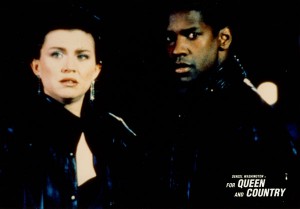
Denzel Washington (Cry Freedom) stars in this new British thriller by Martin Stellman about a black veteran who returns from nine years in the British army to encounter poverty and racism in London. A West Indian by birth, he finds that he is unable to renew his passport because of a new law, and a series of other misfortunes and injustices gradually force him against his will into a life of crime. Effective radical agitprop, relentless in its anger, this film is more outspoken about contemporary racism in England than any other feature that comes to mind; the story is structured a bit like a Warner Brothers thriller of the 30s, and the script (by Stellman and Trix Worrell), direction, and performances all give it a powerful impact. With George Baker, Amanda Redman, Dorian Healy, Geff Francis, and Bruce Payne. (JR)
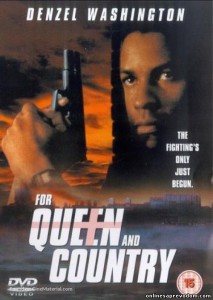 Read more
Read more
From the Chicago Reader (August 17, 1990). — J.R.

PUMP UP THE VOLUME
**** (Masterpiece)
Directed and written by Allan Moyle
With Christian Slater, Samantha Mathis, Scott Paulin, Ellen Greene, Annie Ross, Cheryl Pollak, and Andy Romano.
It’s hard to talk seriously about the 60s today, because TV and a lot of assholes have almost ruined it. When I taught film courses in southern California in the mid-80s, I was appalled to discover that college students thought of the 60s as a traumatic, troubled period — a time characterized by young people losing their way, freaking out on bad acid trips, denouncing their parents, getting killed in Vietnam, and protesting the way American society was being run and abjectly failing at it. For students of the 80s, the golden age was the repressive, bland, stultifying 50s, when staunch family and property values were both firmly in place — the mythical past that Uncle Ronnie and all his furry friends comfortingly evoked.
Many of these students didn’t realize — and some of them still don’t — that the 60s was a more prosperous period than the 50s, economically as well as spiritually. Some people actually had fun at demonstrations and on hallucinogens, and they often accomplished and learned important things in the process. Read more
From the Chicago Reader (April 1, 1995). — J.R.
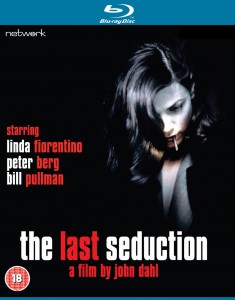
Linda Fiorentino proudly and impressively mounts the throne of bitch noir goddess in this 1994 feature directed by John Dahl (Red Rock West) from a Steve Barancik script. There’s really not much to keep the picture going apart from her unbridled ruthlessness, but there’s plenty of fun to be found in that delectation alone. After goading her husband to pull off a dangerous drug deal and then running off with the loot, leaving him to the mercies of a deadly loan shark, she picks up another unsuspecting (if ambitious) fall guy in a small-town bar and schemes some more. Unlike the classic noirs, this is grounded in neither a recognizable social reality nor a metaphysical sense of doom — just a lot of sexy attitude, humping, and heavy breathing. But it’s an entertaining and caustically humorous thriller if you like that sort of thing. With Bill Pullman, Bill Nunn, Peter Berg, and the ever-reliable J.T. Walsh. 110 min. (JR)
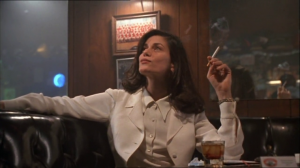 Read more
Read more
From the Chicago Reader (December 1, 1993). This film will be out soon on a Blu-Ray from Twilight Time. — J.R.
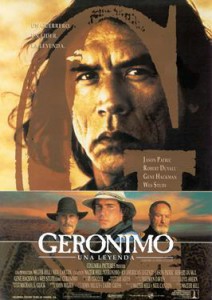
Like Unforgiven, this is conservative revisionism with a rare bitterness of tone (1993). The subject here is the underhanded treatment of Apaches by the U.S. government, and perhaps because of where it’s coming from it’s a lot more convincing as history than liberal revisionist westerns like Dances With Wolves. Though the director is Walter Hill, the dominant personality is John Milius, who wrote the story and collaborated on the script with Larry Gross, and despite some narrative stodginess in spots, Milius’s sense of warrior nobility and his talent for writing juicy parts for actors serve the picture well. Recounting the final rebellion and surrender of Apache leader Geronimo in the 1880s, the film offers especially fine performances by Robert Duvall as a grizzled Apache scouter, Cherokee actor Wes Studi as Geronimo, and Jason Patric as a U.S. cavalry lieutenant assigned to bring Geronimo in, and Gene Hackman, Matt Damon, and Kevin Tighe are more than adequate in less showy parts. The Utah settings are spectacular, and the music is by Ry Cooder. (JR) Read more






